#rebel queen of country series
Photo







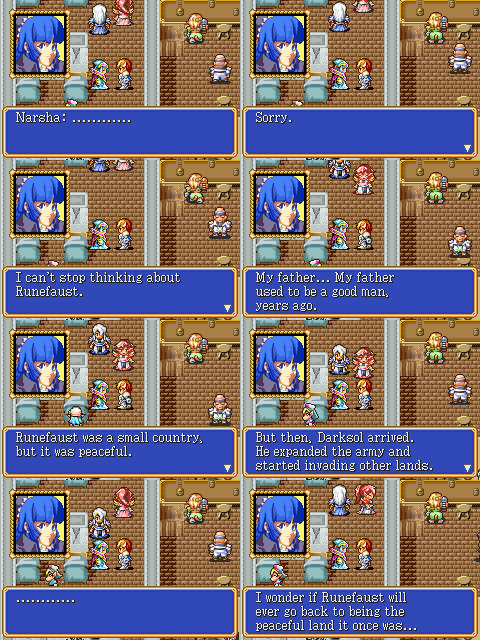

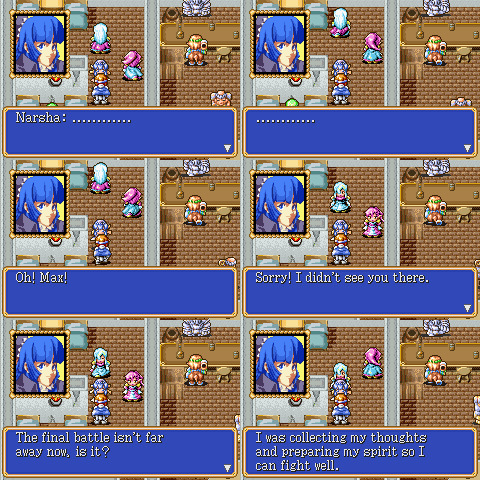


#shining force#ressurection of the dark dragon#sfrodd narsha#shining series#long post#sfrodd hq dialogue#haters will be like 'she's a mary sue >:((' and i'm like 'she's a mary sue :DD'#finally a self insert to my standards#'anri is so great. mae is so great. everyone here is so nice' <- opinions of good and enlightened people#...still weird that it takes her one year to rebel when she admits here she knew runefaust has been conquering stuff for a while#the guide book has that interesting tidbit about life being harsher in the east#so i wonder if it was easier to make excuses when it came to 'uniting' with the neighboring countries#oh wait i forgot to make fun of her some more#'i wonder if i'm being of any use to you' <-- literally the most important member of the team#she's just busy drooling over the other girls to notice#queen
2 notes
·
View notes
Text

Dark forest
HQ 3k full artwork + before and after here
Wonderfully beautiful prince of the magical kingdom of Metamoor/Meridian. Ruler of monsters, a powerful sorcerer, heir to the throne of Escanor, possessing the power of light, he retires into his dark gardens and forests to create loyal servants from flowers and his blood and flesh, the Murmurers or Whisperers, and then an army from them. And he seized power, since there was a matriarchy in the kingdom.
I like his unusual image and character, although he lacks depth and elaboration due to the original format (comics and animated series). But what if we look differently and deeper? He is not as evil as he is portrayed, he does not execute or kill even rebels and opponents of his power, at least he is more merciful than the kings of the Middle Ages. And still, he is a smart ruler, an excellent strategist and politician, he grew up in the palace and knows the rules games, unlike his stupid little sister Elion, who has no control abilities.
Matriarchy in the royal family is explained by the transfer of special magical powers through the female line, but we see that Phobos is still stronger, so much so that he became a threat to all worlds, that he wanted to take over the entire universe and establish his own order. It was because of him that the Veil was created to protect all worlds from Meridian/Phobos. However, this caused damage to the kingdom, they became isolated from all worlds, trade stopped and a crisis began in the country. Phobos originally hoped to break through the Veil and free Meridian, but for this he needs more magical powers, and he draws them from the land of Meridian, sacrificing the fertility of fields and gardens. As far as I remember, he did not want the death of his kingdom, there is a phrase that he says that he needs the power of Elion, otherwise Meridian will come to an end. This means that he is still worried about leaving strength for the country.
I'm leaving out some of the silly bits in the story, as well as some of the plot points that don't make sense, but overall, I like to think along those lines.
Also, it seems to me that his androgynous image is explained by the fact that when he was born, he was raised as a girl in some way (remember Gwyndolin from Dark Souls), since the country was a matriarchy, and the queen thought that he was the only heir. He was taught to be a ruler. And he grew up with this thought until Elion was born, a girl to whom all power would be transferred. And this could greatly hurt his ego, destroy his goals and years of preparation for the throne, and it is understandable. He's not a hero, but he's not the pure evil that people want to make him out to be. He's more in the gray area.
#art#fanart#phobos#prince phobos#forest#digital art#phobos escanor#androgynous boy#au#headcanon#character
30 notes
·
View notes
Text

COVER REVEAL AND FIRST CHAPTER AVAILABLE NOW ON IO9
The rebels have won, and the empire is withdrawing from Qazal. But undoing the tangled web that binds the two nations will not be easy, and Touraine and Luca will face their greatest challenge yet.
Luca needs to oust her uncle from the Balladairan throne once and for all and take her rightful place as Queen. But he won’t let go of power so easily. When he calls for a “Trial of Competence” and Luca’s allies start disappearing from her side, she will need to find a way to prove her might. And she knows someone who can help…
Touraine has found a home in the newly free country of Qazal. But she soon realizes that leading a country and leading a revolution are two very different tasks. And, even more importantly, if Luca’s uncle doesn’t ratify the treaty, the Qazali could end up right back where they started.
Together, the two women will have to come overcome their enemies, their history, and their heartbreak in order to find a way to secure Luca’s power and Touraine’s freedom.
The Faithless is available for preorder now. It will release March 7, 2023. The first in the series, The Unbroken, is available wherever books are sold.
#the unbroken#the faithless#cl clark#big dyke energy#cover reveal#first chapter#lets go lesbians#fantasy books
80 notes
·
View notes
Note
Hey there Paladin! Hell’s Rebels campaign update on my CG inquisitor of Cayden Cailean handling the evil inquisitor of Asmodeus responsible for destroying his family and the death of his adopted brother:
After a thorough series of questions, she pretty solidly established her staunch adherence to her faith, lack of remorse for anything done in its service, and total disinterest in helping us. Short story: it was a bit like watching the Basterd’s interrogation of a N*zi officer in Inglorious Basterds. She didn’t care to help us or our cause in the slightest and would rather die than betray queen, country, or faith.
As for the events of my character’s backstory, she’d committed so many years of atrocities in the name of her church that she couldn’t even remember the incident in question. “Listen, I’m sure what happened was a very important day for you, but to me, it was just another Toilday. I’m sure your family was paid an appropriate amount for [your brother’s] value - as a slave.”
Rather than having our Slayer of Ragathiel kill her however (which would’ve been appropriate for his religion), my character did so himself with a carefully-placed critical from his rapier after allowing her a chance for last words, of which she had none. “I’ve come to learn that there’s a difference between justice and revenge, though sometimes they can be the same thing: Revenge is something you do for yourself. Justice is something you do for others.”
A fine conclusion to the story. Thank you for sharing, and forgive me for not always answering questions, I sometimes don’t have the energy for even innocuous ones.
12 notes
·
View notes
Text
Red Queen
By Victoria Aveyard
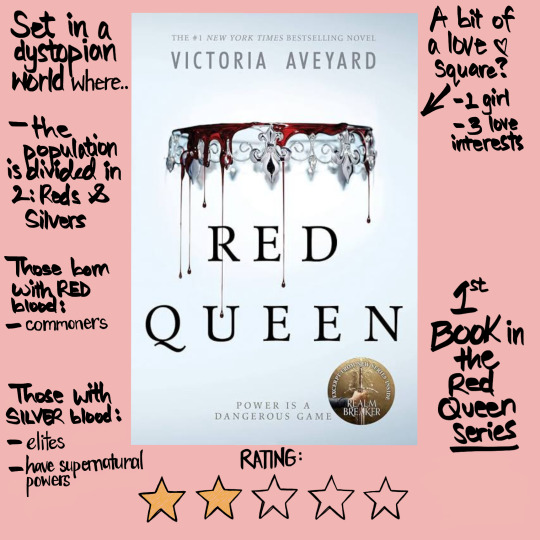
The PREMISE, The premise of this book is what easily caught my attention but as I proceeded to actually read the book, that’s where it lost me.
Quick Plot Summary:
Mare Barrow is our main character, born into a world divided by blood, and in this world you are either a red or a silver.
The reds are the commoners who labour away all day and the silvers are the ruling class, born with supernatural powers.
But what happens when this “norm” is disrupted by none other than our main girl; Mare Molly Barrow. In a turn of events it is discovered that Mare, a red, has supernatural powers of her own much to the surprise of everyone, including Mare herself. Why and how does Mare have the abilities that she does? Is she the anomaly or could there be others?
What follows is the beginning of a revolution.
Thoughts:
The idea was there, the execution, however, was not. Initially, I was intrigued by the premise, if you have two very different groups of people; reds and silvers, how can someone like Mare exist? Why does she have the abilities that she does despite having red blood?
I felt there was potential for me to like this book, but it was the characters that really deterred me from giving anything above 2 stars.
Mare was a bland main character, she really wasn’t standing out much from any other protagonist in a YA dystopian setting which made the book overall feel less memorable. The same could actually be said for the world building in general. It was an okay book with an okay protagonist but it wasn’t doing much for all the praise it seemed to be getting on social media.
Mare makes mistakes (like anyone else does) but doesn’t seem to learn from them nor grow as a character. There’s not much character development, and whilst I am aware that this is only the first book in a series, there doesn’t seem to be much promise for her character to get any better.
The rest of the characters suffered the same fate and were just as annoying.
There's a scene in this book that lives rent free in my brain (not because it’s particularly amazing but because I don’t remember ever cringing so hard from reading a book) :
Mare and the rebel gang are all together, plotting and scheming as one does, and they start to brainstorm how their plans are going to take care of a whole legion of soldiers under Cal (the big brooding brother)’s order.
Maven chimes in with “I happen to know a girl who knows a general very well” (**hint hint, It’s Mare and the general she knows very well is Cal).
She goes off on a lil tangent of “C’mon this is Cal, the solider, the general, the prince, Cal would never betray his country, not for anything!”
………literally the following excerpt reads “I know my brother, if it comes down to it, we both know what he’ll choose”
Mare ‘not like other girls’ Barrow responds “He would never choose me”

Maven shakes his head. “He will always choose you.”
Giirrllllll………..what the actual………. The way my eyes rolled so far back into my head (if that's even correct). I shut that book up and THREW it across the room.
I’m sorry but it feels like he just met you and before this dialogue she literally comes to the realisation that he loves her. How? How did this happen when they’ve only had a handful of scenes together where there was barely any build up. I can understand if he likes the girl and vice versa but love?! Bye. This book was testing me.
Mare had the personality and charisma of a blank piece of paper and I’m supposed to believe she had 3 guys head over heels in love with her.
Overall this book was very much a product of its time. Any redeeming traits were far and few and I just didn’t like it but that could just be me. If the premise seems interesting to you and you’re wanting to read it, be my guest.
#the red queen series#red queen#victoria aveyard#mare barrow#maven calore#cal calore#red queen series#book thoughts#bookish#books#booklr#fantasy books#book review#book reviews#young adult fantasy#fantasy book#book blog#bookblr#bookworm#books and reading#ya books#young adult books#young adult fiction#romance book#romance books#dystopia#dystopian fiction#dystopian books
2 notes
·
View notes
Text



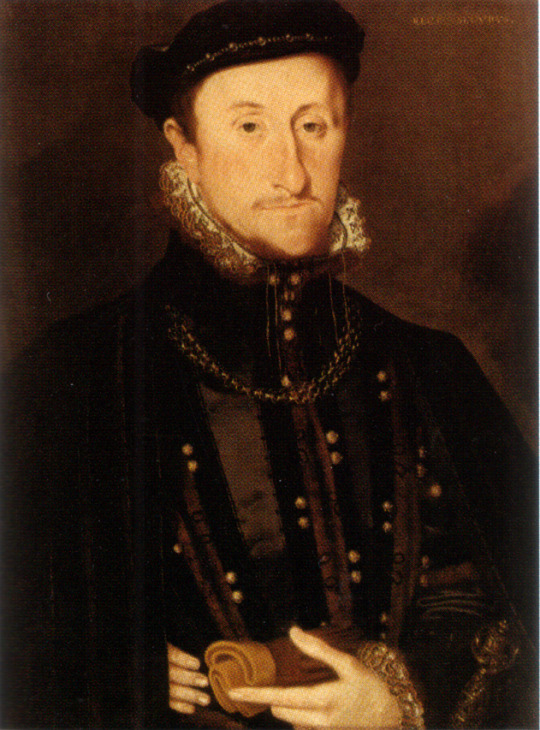

On January 23rd 1570 James Stewart, the Regent Moray on the abdication of Mary Queen of Scots, was murdered in Linlithgow.
The assassination by James Hamilton of Bothwellhaugh was the first known assassination with a firearm, obviously other deaths by firearm will have happened, but the term means a high profile killing, like that of a political figure, like Moray.
James Stewart, the 1st Earl of Moray,, known mainly as just Moray, partly caused the downfall of Mary Queen of Scots, his own half-sister. Historians like to portray her as a tragic heroine and Moray has long been seen as the villain of the piece.
Religion, politics and sheer hatred were the prime causes of his assassination for the perpetrator was a Roman Catholic, James Hamilton of Bothwellhaugh, whose family were staunch supporters of Mary and had personal grudges against the Regent.
Born in 1531, Moray was the illegitimate son of King James V and his mistress, Lady Margaret Erskine. James wanted Margaret to be his Queen Consort and he unsuccessfully petitioned the Pope that she could get a divorce from her husband so he could marry her and thus legitimise young James, who would then have become King James VI with Mary, Queen of Scots, nowhere near the throne.
Raised a Catholic, it is not known exactly when Moray converted to Protestantism, and it may have been through a meeting with John Knox, but it did not stop him acting as a commissioner in the negotiations for the marriage of his half-sister Mary to the Dauphin of France on behalf of the queen’s regent and mother, Mary of Guise.
With the other Protestant Lords of the Congregation he turned against Mary of Guise, though when Queen Mary’s husband King Francis II died, it was Moray who went to France to fetch Mary home to reign over Scotland.
As a close adviser to Mary, who had declared freedom of religion, he dealt firmly with both John Knox who wanted Mary to be banned from attending Mass, and the Catholic rebel George Gordon, Earl of Huntly, who he defeated at the Battle of Corrichie in October, 1562.
In reward, Mary made James both Earl of Mar, briefly, and Earl of Moray, the latter a revived title. By 1565 they had fallen out, however, over Mary’s choice of the Catholic Henry, Lord Darnley, as her consort.
Moray broke out in open rebellion against the Queen and there followed the so-called Chaseabout Raid with a series of close encounters that ended with Moray fleeing to England where he had to explain himself to Queen Elizabeth.
Moray spent time forging links with the English authorities and was absent from Scotland when both David Rizzio and Darnley were murdered, so he could not be blamed for either.
Moray left the country again when James Hepburn, the 4th Earl of Bothwell, married Mary and tried to take charge of the country with the support of the powerful Hamilton family.
The Lords of the Congregation began an open civil war against Mary and after the bloodless Battle of Carberry, Mary was forced by them to abdicate and was imprisoned in Loch Leven Castle in July, 1567. Moray returned to Scotland the following month and was made Regent for the infant James VI.
After Mary’s dramatic escape from Loch Leven, at the Battle of Langside near Glasgow on May 13, 1568, Moray’s stronger forces soundly defeated Mary’s supporters, led by the Hamiltons, causing her to flee to England.
Moray already had some enmity with the Hamiltons who continued to resist his rule. After a year of suppressing support for Mary in the south and west of Scotland, he razed the Hamilton stronghold, Rutherglen Castle. By the end of 1569 he had managed to bring all parts of the country into an uneasy peace – a formidable achievement. Only Dumbarton Castle held out for Mary. He was on his way to arrange its recapture when he passed through Linlithgow on this fateful day in 1570.
James Hamilton of Bothwellhaugh had a personal grudge against Moray who had evicted his family from their homes. He lay in wait behind the window of his uncle Archbishop John Hamilton’s house on the high street of the town, and as Moray passed on horseback, the assassin struck.
There is a contemporary account of the event in the diary of Robert Birrel, a burgess of Edinburgh , who chronicled all the diverse happenings of most of the decades of the 16th century, writing;
“The Earl of Moray, the Good Regent, was slain in Linlithgow by James Hamilton of Bothwell-haugh, who shot the said Regent with a gun out at ane window, and presently thereafter fled out at the back, and leapt on a very good horse, which the Hamiltons had ready waiting for him; and, being followed speedily, after that spur and wand had failed him, he drew forth his dagger, and struck his horse behind; whilk causit the horse to leap a very broad stank; by whilk means he escaped.”
Moray had been shot below the navel, and though he walked away, his death later than night was inevitable. He was just 38.
Hamilton escaped to France and was never captured, but members of his family, including Archbishop Hamilton, were arrested and executed for their alleged part in the murder.
Moray was buried in St Giles Cathedral, with John Knox preaching at his funeral. As seen in the pics there is a stained glass window in the cathedral which tells the story of the assassination and which depicts Knox preaching – ironic, since Knox always railed against such "Papist decor."
The Earl left a poisoned legacy, namely the so-called Casket Letters which were used against their alleged author Mary, Queen of Scots, in the proceedings that ultimately led to her execution in 1587. It was Moray who acquired those letters and showed them to the English nobility.
Other pics are a later depiction of the scene and a photo of the rifle used in the assassination.
For that alone, he is often reviled by the fans of Mary.
13 notes
·
View notes
Text
Book recommendations: can't wait for the next book
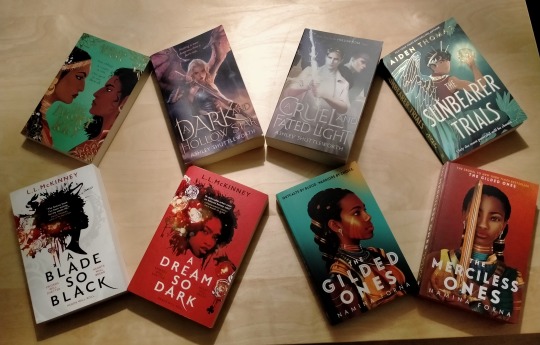
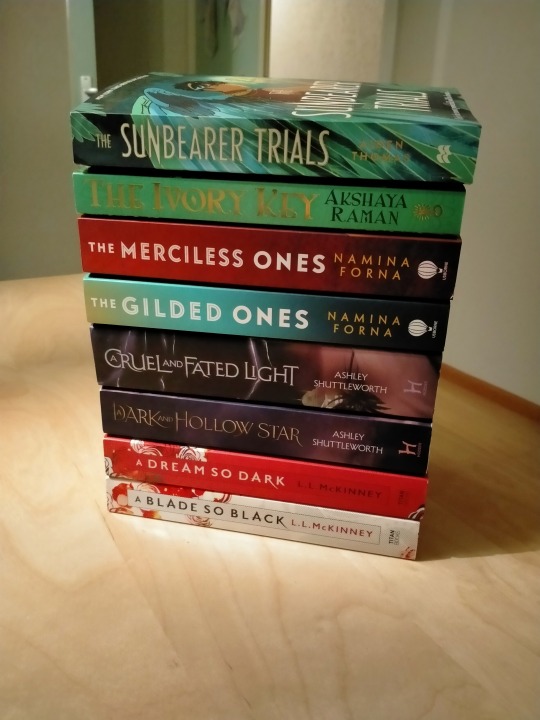
A while back I did a post with complete series. This time I figured I'd do a post with a couple of series that have another book coming in 2023 instead. Or, well, presumably 2023, since for some of them I'm not 100% sure about when the next book is coming out, but if I do know I'll list it. I also considered putting Legendborn in here, but I don't own Legendborn, my sister does and at the time of taking this picture I didn't have access to her books, that series would fit this category too. Let me know if there are any other sequels you're waiting for! This certainly isn't all of mine, but I picked a couple of books that I hadn't covered yet (and one I am repeating, but bear with me)
First up is the Ivory Key by Akshaya Raman. The Ivory Key is the first book in a duology and is set in a world inspired by India. This country depends on magic to protect itself from foreign invaders, but they keep magic in a vault underneath the palace and it is running out. Vira is the Queen of Ashoka and is desperate for solution. She discovers that there are more vaults with magic, locked by the ivory key that she'll have to find. Desperate, she asks her siblings for help. They agree, but each have their own motivation for wanting to find the key. While Vira wants to save her country, Ronak wants to sell the key to the highest bidder to escape a political marriage and their younger sister Riya wants to give the key to the rebels to prove her loyalty to them. Their oldest half brother Kaleb was falsely imprisoned for murdering the former queen, and needs it to prove his innocence. The book has a quest to find this key and four siblings who are all working together but also against each other for their own goals and splits its POVs between the four siblings.
The book shown on the picture is the UK edition and the US edition has a different cover. Book 2, the Crimson Fortress, comes out 1 August 2023.
Next I have the Hollow Star Saga by Ashley Shuttleworth. There are currently two books out in this series which are a Dark and Hollow Star and a Cruel and Fated Light.
This series is set in modern day Toronto and features a world with fae courts that hide themselves from humans. It follows four main characters who end up tangled up in te same mystery.
Arlo is an ironborn, a half fae whose mother is a princess in the most important royal family of fae, but because she's half human she is an outcast in her family.
Nausicaa is an ex fury who was cast out of the immortals for killing a bunch of people, known as the dark star.
Vehan is the prince of the Seelie Summer Court, which is a different royal family than Arlo's from. He is dutiful, but naive and has no idea that his mother is evil.
Aurelian is Vehan's best friend and body guard, whose relationship with Vehan is strained because of a secret he has to keep.
The first book follows these characters as they investigate a series of ironborn murders no one else seems to care about. Vehan especially is passionate about finding the culprit, whereas Nausicaa is only really helping out because people are “—runnin’ around accusing perfectly innocent assholes of assholery they’ve been actively trying to avoid.” as said by Nausicaa in the book. Seriously, she's hilarious. Things get a lot more intense in book two, which I won't give too much away about. Book 2 also adds Celadon to the main cast (he was already important in book 1 but gets a POV in book 2)
All the major characters in this book are queer, with Arlo being questioning, Nausicaa's a lesbian, Vehan's bisexual and Aurelian's gay.
The next book is a Grim and Sunken Vow and is scheduled for fall 2023, but the exact date is as of yet unknown. After that there will be one more book.
I know I've already talked about the Sunbearer Trials but this book is so great it bears repeating.
I already summarized the story, a group of semidioses doing a competition where the loser dies, so I figured I'd talk a little more abot my favorite character Aurelio. Aurelio is the son of Lumbre, diosa of fire, and has a twin sister Auristela. Most people don't really like Auristela since she is not very nice and needs to be the best at everything, but Aurelio is really close with his sister. As a child he was really shy and awkward and he ended up befriending Teo but at some point he kind of stopped talking to Teo so now they're awkward ex friends. Aurelio is very dutiful and literal and sometimes I feel like he might be autistic. He is also Teo's love interest though that is something that develops slowly.
If you haven't read this book yet, I'd seriously recommend it. Book 2, which should be the last one, is as of yet untitled and has no release date. It currently says 2023 but I can't guarantee it'll be published that year. I sure hope so though, with how the last one ended.
A Blade so Black is a little older than the other books here, but for some reason it took a while for the third book to come out, I'm not completely sure what happened here. There are currently two books out, a Blade so Black and a Dream so Dark. I have the UK editions but I'm honestly not sure if there will be a UK edition of book 3 since there was so much time between the last release and this one, so if you're very passionate about having a matching set I'd recommend getting the US hardcovers as the third book will release in that edition.
This trilogy is a retelling of Alice in Wonderland in which Alice is a modern day bi Black girl living in Atlanta, juggling her strict and protective mother and a high maintenance best friend with her secret job of killing nightmares, which are monsters born from wonderland that slip into our world. When her mentor Hatta (who I'm pretty sure is supposed to be the Mad Hatter) gets poisoned, Alice has to go deeper into wonderland than she's ever been to find a cure. In the olden days, a lot of YA contemporary fantasy books were very vague about the role of parents. Lots of parents who had no clue what there kids were up to also didn't really pay attention and just let them do whatever? To be fair, that could have been my parents. But for a lot of people and that was not very realistic. Alice' mom is very protective, and for good reason, but does not know what's going on in Alice' life and Alice regularly has to make excuses for her absences or have her best friend Courtney cover for her and the books balance the adventures in Wonderland quite well with Alice having to keep up her normal teenage life.
The third book, a Crown so Cursed will 11 April 2023
Last but not least is the Gilded Ones trilogy, with currently two books out, the Gilded Ones and the Merciless Ones.
Deka lives in a small village in a very misogynistic world where at her sixteenth birthday, she will be checked for the color of her blood to see if she is pure or not. When her blood runs gold, she knows she will be killed. Only Deka doesn't die. In fact, the villagers kill her many different ways and every time Deka wakes up, until a woman travels to her village and offers her the choice to come with her and fight in an army of alaki, girls like her who are near immortal.
But nothing is quite as it seems, not even what Deka believes is the greatest threat to her country.
This book is an interesting fantasy that focused primarily on misogynie from the POV of a Black woman (although racism as we know it isn't really a thing in this world). In the second book, there is also some exploration of rad fem/terf ideology and how simply hating and turning against all men/amab people is not a good way of dealing with oppression, and one of the older alaki is revealed to be a trans woman.
@alastaircarstairsdefenselawyer @life-through-the-eyes-of @astriefer @justanormaldemon @ipromiseiwillwrite @a-dream-dirty-and-bruised @amchara @all-for-the-fanfiction @imsoftforthomastair @ddepressedbookworm @queenlilith43 @wagner-fell @cant-think-of-anything @laylax13s @tessherongraystairs @boredfangirl16 @artist-in-soul @bottomdelioncourt @ikissedsmithparker
#the ivory key#Akshaya Raman#a dark and hollow star#a cruel and fated light#ashley shuttleworth#the sunbearer trials#aiden thomas#a blade so black#a dream so dark#l.l. mckinney#the gilded ones#the merciless ones#namina forna#book recommendations#ongoing series
7 notes
·
View notes
Photo
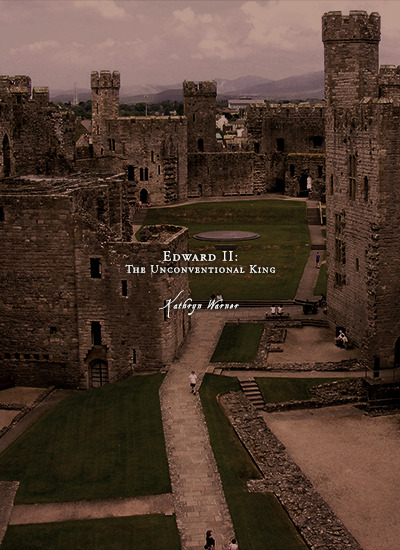
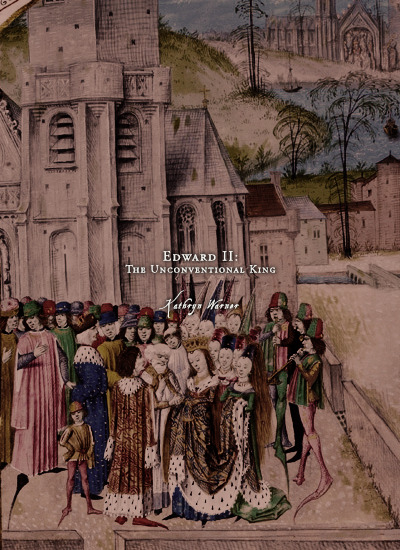

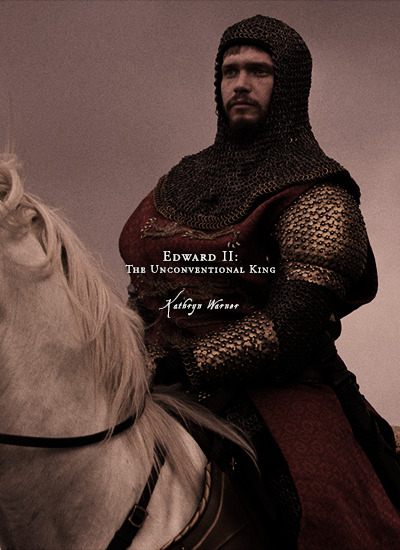


Favorite History Books || Edward II: The Unconventional King by Kathryn Warner ★★★★☆
I could not be other than I am. Edward II’s entire life was a battle against what was expected of him. Entirely unconventional by the standards of his time, even eccentric, he had neither the temperament nor the ability to fill the position he had been born into, to the great unhappiness of himself and his subjects. His reign of nineteen and a half years, July 1307 to January 1327, was a turbulent history of constant threats of civil war, endless conflicts and quarrels with his barons, failed military campaigns and dependence on male favourites. Before his accession, no English earl had been executed since Waltheof in 1076. During Edward’s reign and its immediate aftermath, the regime of his queen and her own male favourite, an earl counted himself lucky to die in his bed. No fewer than six were executed between 1312 and 1330, and two died in battle.
Edward’s reign ended in his own wife rebelling and launching an invasion of his country, his forced abdication in favour of his son and, according to traditional accounts, in his atrocious murder. Subject to scathing criticism in his own lifetime, Edward has fared even worse since. ‘A more complete ninny than Edward II has seldom occupied a throne’; ‘Brutal and brainless … incompetent, idle, frivolous and incurious’; ‘A scatter-brained wastrel’; ‘A weakling and a fool’; ‘Weak-willed and frivolous’; ‘A coward and a trifler’; ‘Worthy never to have been born’ are just some of the harsh judgements passed on this most maligned of monarchs. That Edward II was an utter failure as a ruler and war leader is very hard to deny. After all, no king ends his reign wandering around Wales with a mere handful of followers, pursued by an army, without making a long series of truly horrible mistakes. However, Edward had the misfortune to be born in the wrong era. Many of the character traits and behaviour that made him such a disastrous king, and were incomprehensible and even shocking to his contemporaries, would be judged differently today. In many ways, Edward was ahead of his time. He was openly a lover of men, he enjoyed the company of his lowborn subjects and their activities such as thatching roofs and shoeing horses, he bought his own fish and bread, he spent much time near the end of his reign living in a cottage rather than in one of his luxurious palaces, he once had to pay compensation to his jester for accidentally injuring him while swimming in the Thames in winter, he went on a swimming and rowing holiday with a large crowd of ‘common people’, he watched fishermen fishing and ditchers digging and sometimes joined in, he loved the outdoors and physical exercise, he is one of only two people in history to found colleges at both Oxford and Cambridge.
Edward inspired polarised opinions in his own lifetime and afterwards. Many people despised him. A few adored and were passionately devoted to him. Edward was a complex and difficult man, and a bundle of contradictions. Fiercely emotional, he loved and hated to extremes, could nurse a grudge for many years and never forgave a betrayal, though on the other hand he was remarkably generous and kind to people he loved and those who pleased him. Although often amiable and good-natured, with a highly developed sense of humour, he had a vile temper and could be unpleasant and spiteful. He reacted, and frequently overreacted, emotionally rather than with his intellect, and his personal likes and dislikes entirely dominated his policy throughout his reign. He showed little in the way of determination or ambition, except when his male favourites were threatened. Then, he acted with great energy and astuteness, to the intense frustration of his contemporaries; he had plenty of ability when he chose to use it, but directed it to the wrong ends. His indecisiveness was also infuriating, and he had a tendency to believe and act on whatever the last person had said to him. His great-grandson Richard II made unsuccessful attempts to have him canonised as a saint, and the fourteenth-century chronicler Geoffrey le Baker depicted him as a Christlike figure nobly suffering the torments of lesser people. On the other hand, the Westminster chronicler spoke at length of his ‘insane stupidity’ and his ‘wicked fury’, and other contemporaries despaired of him and his inability or unwillingness to be what his subjects wanted and needed him to be.
… He was passionate, brutal, kind, generous, capricious, indolent, spiteful, obsessive, good-humoured, affable, foolish, erratic, gracious, shy, charming and vengeful. He was Edward II, and this is his life and death.
#litedit#historyedit#edward ii of england#house of plantagenet#medieval#english history#european history#history#history books#nanshe's graphics
12 notes
·
View notes
Text
Title Announcement
Big news! Kingsley aka the Queer Croc WIP has an official title!

I’ve been working on this book for ten years and I had a title for a while, but then it didn’t work anymore and I settled on Kingsley as a placeholder. I actually considered just calling it Kingsley but Kingsley by Kingsley Montivelo sounded and look weird. After that failed, I was this close to just calling it the Queer Croc Book and move on. Then last night I had an epiphany. So, without further ado the official title is *drum roll*:
Say That I Slew Them Not
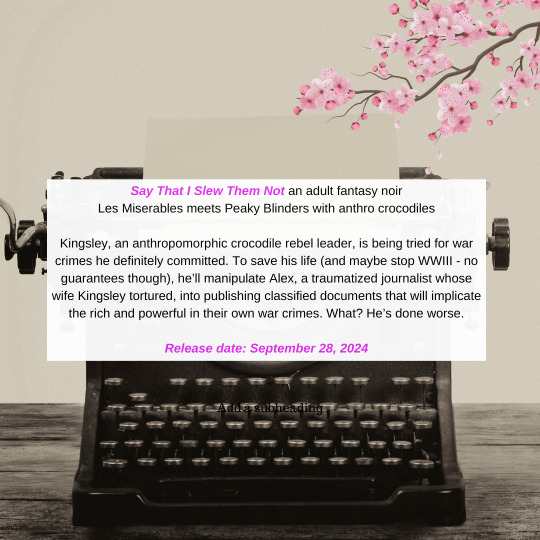
Origin of the Title
The title comes from William Shakespeare’s play Richard III (one of my favorite plays). Richard is trying to woo Anne, who’s father-in-law he just murdered. Oh, and he’s trying to woo her over her father-in-law’s corpse because he’s such a nice guy, haha. During the conversation, Anne calls Richard a murderer and he says:
RICHARD Say that I slew them not.
ANNE Then say they were not slain.
But dead they are, and, devilish slave, by thee.
While I love Richard III, this line sticks in my memory mostly because Robert Jordan, the lead prosecutor at the Nuremberg Trials, used it in his closing statement. He argued that the Nazis claimed they committed no crime because they followed the law. Similar to Richard III, they were asking their victims and the world to declare them innocent. Jordan claimed:
“They stand before the record of this trial as blood-stained Gloucester stood by the body of his slain King. He begged of the widow, as they beg of you: 'Say I slew them not.' And the Queen replied, 'Then say they were not slain. But dead they are,' If you were to say of these men that they are not guilty, it would be as true to say there has been no war, there are no slain, there has been no crime."
Why This Title?
You’re probably thinking, ok great, but how does this connect to a book about queer anthro crocodiles?
First, the Nuremberg Trials and the concept of international law are a huge source of inspiration for the Nothing but Glory series as a whole. One of the biggest takeaways from Nuremberg is it’s nice to think we can create a system that holds each other accountable, but how can we when that very system is built on the destruction of others/the system cannot or refuses to apply the law equally to all perpetrators of war crimes. My own country, the United States, being one of the biggest culprits that has never been held accountable.
That is the true heart of the book Say I Slew Them Not. Yes, Kingsley is a rebel leader who is trying to prove that he’s not as bad as he claims, but the true question isn't whether Kingsley is a terrible war criminal or not (he is). The real question is why is Kingsley the only war criminal being put on trial when other pardoned war criminals testify against him and/or hold positions of power within the government and international system. Additionally, those same pardoned war criminals made the political, economical, and social decisions that drove Kingsley and others like him to commit acts of great violence. When only Kingsley is held accountable for his actions, is it true justice or is it an act of political power or theater? Is there any point in holding individual people accountable when it’s the system that is designed to reward certain behavior?
So I really like the connection between Kingsley’s trial (and the concept of international justice in my world) with our own international justice system.
I also like the connection between my book and the scene in Richard III. Kingsley is responsible for a lot of deaths and betrayals, like Richard. In the Shakespeare scene, Richard’s attempts to woo Anne can be read as manipulative (and same goes for Kingsley), but it could also be read as a moment of true vulnerability with Anne in order to win her over. Still manipulative, but the emotion can also be real, which is also true for Kingsley. I could have made the title stronger: I Slew Them Not, but the conviction is wrong. Kingsley claims he’s “innocent” but he knows what he’s done and I think he is looking for some sort of validation: “Tell me I didn’t kill them all. Tell me I, alone, am not responsible for all this horror”
There is also a sarcastic twinge to the title, because the Hevians, the people who Kingsley rebelled against and are trying him for war crimes, constantly deny they ever did anything wrong ever. Heva, the colonial democracy who stripped Kingsley’s people of their home, their rights, their language, their religion, etc., who purposely poisoned Kingsley’s homeland, and a bunch of other horrible things. They pretend none of those things ever happened. They are “innocent” either because they are truly disconnected from reality or because it’s Hevian law to treat their colonial subjects like trash and so there was no crime. And so, by calling his memoir about Heva’s crimes: Say I Slew Them Not, he’s making fun of them and their ignorance.
It’s that train of thought that convinced me this was the perfect title. In the United States we have a growing movement of white supremacists who are rewriting, erasing, and suppressing the truth so they can claim that “there was no crime”, but the history of the United States is full of crimes against humanity and acts of genocide. Just like the Hevians, we as white people can no longer claim the horror didn’t happen. We can no longer ignore that it's still happening.
It’s something my characters and us in the real world must grapple with if they, and us, want to build a progressive, loving world.
#my writing#queer writers#writblr#writers on tumblr#kingsley#queer anthro crocodiles#queer croc wip#title announcement#release date#say i slew them not
2 notes
·
View notes
Text
Edward II


Derek Jarman’s EDWARD II (1991) is much more Jarman’s work than that of playwright Christopher Marlowe. Jarman fragments the plot and language, using imagery in place of Marlowe’s poetry and narrative development. It’s almost a series of vivid, beautifully designed snapshots of the play. Jarman also mixes periods, combining medieval props with costuming from the 1940s and the early 1990s, even presenting Edward’s army as LGBTQ protestors, played by members of the British political action group Outrage. That certainly contemporizes the film, but Jarman doesn’t do anything to whitewash the story. King Edward (Steven Waddington, whose handling of the verse is quite impressive) calls back his low-born lover Gaveston (Andrew Tiernan) and elevates him to a position of power to the consternation of the country’s nobles and his jealous wife (Tilda Swinton). These aren’t the saintly gays of Hollywood social-problem films. Gaveston is a relentless parvenu who glories in and misuses his newfound power. The major change Jarman makes to Marlowe’s narrative is having Swinton take Gaveston’s chief enemy, Mortimer (Nigel Terry), as her lover before Edward is forced to banish his lover (Marlowe started the affair after Gaveston’s return from banishment). Swinton’s queen is a fascinating picture of a woman rebelling against her prescribed roles. She’s dressed in couture Eva Peron would have loved, so tightly constricted it’s a wonder she can breathe. She’s as closeted as a human being as the court keeps trying to make Edward and Gaveston. When she finally rises to power, she and Mortimer behave with the same childish ruthlessness as had Gaveston. Maybe that’s the ultimate theme: repression corrupts. All this is played out in a series of stunning images. For Edward’s first parting from Gaveston, Jarman brings in Annie Lennox to perform Cole Porter’s “Every Time We Say Goodbye.” For that one moment, the two lovers, whatever their other problems, become metaphors for every couple forced to separate because their love was forbidden. It was a heady image for the rising gay movement of the 1990s, an intersection between histories of repression and the ongoing battle for freedom. Sadly, in light of current events, it could also be an image of what the future holds.
10 notes
·
View notes
Text
Riot Fest 2022 Preview: 4 Reasons to Come Early, 1 to Stay Late
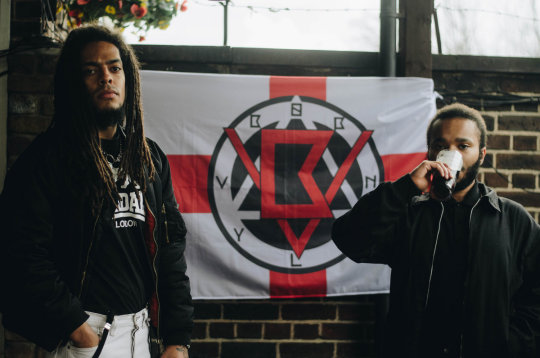
Bob Vylan
BY JORDAN MAINZER
This year’s Riot Fest offers a lot in the way of postponements from previous years, whether Nine Inch Nails’ headlining set 1 year in the making or My Chemical Romance’s triumphant return to the stage 2 years late. But there are plenty of great bands to check out before the sun sets. I’ve highlighted 4 bands worth showing up early for and 1 that will make you want to stick around. Oh, and even if you’re not going, you can buy some or all of each band’s music on Bandcamp.
FRIDAY

Boston Manor, 1:30 PM, Radicals Stage
Next month via SharpTone Records, British rock band Boston Manor will follow up their breakout record Glue and last year’s Desperate Times, Desperate Pleasures EP with Datura, their biggest but bleakest album yet. Recorded with Hundred Reasons guitarist, vocalist, and producer Larry Hibbitt, Datura reflects the time-warped days of the pandemic, nights filled with drinking too much and mornings filled with the repercussions of the nights. Lead singer Henry Cox immediately rattles off a series of stark observations on the alien opener “Datura (Dusk)”: “There’s a fire in the cark park / I see it smoldering / Heard my neighbor kill his own dog for going in the bins.” The music of Datura mirrors a similar pervasive sense of dread, harsh noise enveloping the otherwise dreamy guitars of closer “Inertia” and synth bounce of “Crocus”. The rest of the band--lead guitarist Mike Cunniff, rhythm guitarist Ash Wilson, bassist Dan Cunniff, and drummer Jordan Pugh--provide storming instrumentation alongside the pulsating electronics of “Floodlights on the Square” and synth glitches of instrumental “Shelter From The Rain”.
Live, Boston Manor should play at least a couple of the singles from Datura, such as the reflective “Foxglove” and the dramatic “Passenger”, while also taking the Glue victory lap they weren’t able to experience at the height of the pandemic.
Bob Vylan, 4:15 PM, Rebel Stage
The liner notes on the deluxe version of Bob Vylan’s debut album We Live Here start with the words, “Recorded in 2019, mastered in 2020 and relevant today!” You could follow the same formula for all songs from the UK punk rap duo. Even the song that begins with an order to kill the now late queen may be updated on their current tour to use King Charles’ name instead. Bob Vylan’s music lives in constant urgency. Their second album, the phenomenal Bob Vylan Presents the Price of Life (Ghost Theatre), begins with a sample of a speech from Guyanese historian and activist Walter Rodney: “People in their day-to-day lives will know what it means to be living in a state of economic crisis.” Considering the ever-present ills of colonialism, an unprecedented cost of living and housing crisis, and even some food banks closing on Monday for Queen Elizabeth II’s funeral, Bob Vylan speak from their own experiences and on behalf of others. With a combination of driving guitars, propulsive beats, shouted choruses, and limber flow, the duo target everything from the surveillance state (“Phone Tap”) and big pharma (“Drug War”) to the blissfully ignorant (“Turn Off The Radio”) and fake progressives (“Bait the Bear”). “They say I’m violent,” laughs Bobby Vylan, before declaring, “The whole country’s fucking violent.” Fighting fire with fire out of survival, they’ll bring the riot to Riot Fest in true spirit rather than just aesthetic.
SATURDAY

Alexisonfire, 4:30 PM, Radicals Stage
They reunited 7 years ago, but it wasn’t until this June that Canadian post-hardcore greats Alexisonfire actually released a new record, their first in 13 years. Otherness (Dine Alone) strikes a delicate balance between remaining faithful to what makes the band tick while exploring new genres and styles, like the 8-minute folk, psychedelia, prog metal closer “World Stops Turning”. While they might not whip that one out during their hour-long Riot Fest set, Alexisonfire should churn through Otherness highlights like “Sweet Dreams of Otherness” and the surprisingly soft “Sans Soleil”. Of course, they’ll play classics from albums like Crisis and Old Crows / Young Cardinals, but the Otherness songs should fit in nicely in a live set.
Read our review of Otherness.
SUNDAY

Zola Jesus, 2:50 PM, Riot Stage
On Zola Jesus’ 6th album ARKHON (Sacred Bones), Nika Roza Danilova bares all. The record was born out of a state of vulnerability--heartbreak, change, writer’s block--with Danilova reaching out to collaborators earlier than ever in the creative process, including producer Randall Dunn and percussionist Matt Chamberlain. The result is the most outwardly expressive Zola Jesus album to date. On “The Fall” and “Desire”, Danilova straight up belts, dynamically over a shuffling groove on the former and raw-like over acoustic piano on the latter. “Lick my wounds like you can taste them,” she asks of a partner on “Desire”, making them tangibly consider the end of a relationship. Importantly, though the record is immensely personal, a product of intense alienation, Danilova finds common ground with the listener, finding subtle, clever ways to express the universality of her themes. She sings around syncopated samples of a Slovenian folk choir on “Lost”, the voices individually disjointed but unified in spirit. Her vocals intertwine with Louise Woodward’s chamber accompaniment on the cinematic and thrilling “Dead and Gone”, and with sinewy synths and cascading drums on “Into the Wild”. Ultimately, she speaks for all of us, wondering “How can love be misguided when your heart learns to beat?” ARKHON is forever truthful and empathetic.
Though Zola Jesus is somewhat embedded within the dark wave or industrial realms, her set should be a comparatively experimental outlier within Riot Fest, a can’t-miss at the festival for those looking for something different.

Photo by David Black
Yeah Yeah Yeahs, 7:10 PM, Roots Stage
The firmly rooted NYC three-piece are back, the band responsible for such Aughts indie rock classics as Fever to Tell and It’s Blitz! bringing their beer swilling, microphone swallowing live show to the Riot Fest grounds. More importantly, they’ve got a brand new album out at the end of the month. Cool It Down (Secretly Canadian) is, remarkably, only their fifth album in over two decades of existence, and judging by the early singles, it might be another gem in the band’s catalog. Expect to hear plenty of it on Sunday night, including slow-burning anthem “Spitting Off The Edge of the World” and the building, orchestrated “Burning”.
#live picks#riot fest#boston manor#bob vylan#alexisonfire#zola jesus#yeah yeah yeahs#sharptone#jordan pugh#dine alone#sacred bones#secretly canadian#datura#nine inch nails#my chemical romance#bandcamp#sharptone records#glue#desperate times desperate pleasures#hundred reasons#larry hibbitt#henry cox#mike cunniff#ash wilson#dan cunniff#bobby vylan#we live here#bob vylan presents the price of life#ghost theatre#walter rodney
6 notes
·
View notes
Photo
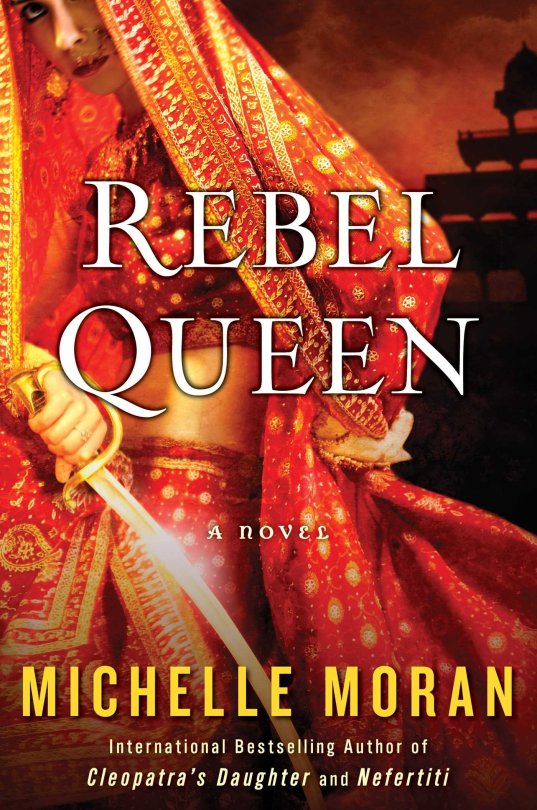
Title: Rebel Queen
Author: Michelle Moran
Series or standalone: standalone
Publication year: 2015
Genres: fiction, historical fiction, romance
Blurb: When the British Empire sets its sights on India in the mid-nineteenth century, it expects a quick and easy conquest. India is fractured and divided into kingdoms, each independent and wary of one another, seemingly no match for the might of the English...but when they arrive in the kingdom of Jhansi, the British army is met with a surprising challenge. Instead of surrendering, Queen Lakshmi raises two armies - one male and one female - and rides into battle, determined to protect her country and her people. Although her soldiers may not appear at first to be formidable against superior British weaponry and training, Lakshmi refuses to back down from the empire that is determined to take away the land she loves.
1 note
·
View note
Text
The Prison Healer by Lynette Noni

Series: The Prison Healer, #1
Read time: 1 Day
Rating: 2.5/5
The quote: Hope was a drug, and Kiva an addict. She couldn't keep believing, couldn't keep trusting, couldn't keep hoping.
We will come.
Ten years. Her family had waited ten years.
We are coming
They should have already come. Before nowbefore Tilda. But they hadn't.
Hurt rose in Kiva's chest, blinding in its intensity, but she pushed it away, shoving it deep within her, just as she had for years.
It was up to her now.
Up to Kiva to survive. — Kiva Meridan
Book Meet Wall, Wall Meet Book.
Here we go. Let's get something out of the way, I don't hate The Prison Healer. It was great right up until the last chapter, I hate the ending. So like Shusterman's The Toll this gets a low rating. 3 rather than 2 because this is book 1 rather than the last book. I will say I am aware what I am about to say is quite possibly a personal hang up. I promise I will review the book as well.
The Prison Healer feels like another case of a book that should have been written as a stand-alone becoming part of a series. I am aware that is part of a wider issue with the publishing industry, not authors. But why oh why can't we have good quality stand-alone books, especially young adult fantasy books. Will I read The Gilded Cage when it is released? No, well not strictly no just highly, highly unlikely. That plot is set up to cause even more malicious pain to established and liked characters. From where this book ends I can see where the trilogy (?) is going to end but ugh the destruction and pain it will take to get there.
Moving onto the plot. The plot for this book is actually slightly more complicated than I originally expected it to be. Kiva Meridan is 17 and conscripted as a healer in Zalindov Prison the holds the worst of the worst in her country. She is despised by her fellow prisoners after selling her soul to save her life, she is the one that brands people. In the middle of winter, the soldiers bring in two new prisoners in quick succession, Jaren an older woman who is rumoured to be the Rebel Queen. There is also the arrival of a new female guard, a rarity. The Rebel Queen has been sentenced to the Trail of Ordeal, which asks her to face 4 trials one for each of the four elements. It is said to be unsurvivable. Due to the Rebel Queen's physical state, blackmail and her family Kiva volunteers to take the Trial of Ordeal in her place. The trials take place over 6 weeks, during those 6 weeks the prison starts to face a deadly plague as the healer Kiva needs to find the answer. All while dealing the charms of Jaren and all issues faced by being a female prisoner in an awful prison.
It's not simple but it is effective. It means the story is always moving, never the same for too long and shows multiple sides of the characters over time. Kiva's strength, intelligence and occasional weakness, Jaren's complicated side, caring and anger, Naari's well everything and Tipp's childish joy, smarts and love for Kiva. I like the writing. It does suit the characters. There are some charters with different speech patterns, some with language that indicates their lower levels of education or possibly intelligence. I'm guessing it does introduce the important future characters as best it can, particularly Mirryn. It does raise some interesting questions about survival and betrayal if you want to see them. Think about it in Nazi Germany terms (as it seems the most culturally prevalent) both in prisons and in places like Gurnsey that were occupied. The differences between pragmatism and evil. And the impact of psychological impacts of this situation. But you can just read it for enjoyment.
Never forget, little mouse: no two people loof the same, but we are each beautiful in our own ways. The human body is a masterpiece that deserves our respect. Always. — (Faren Meridan) This sort of quote shows up a lot when you are reading books with healers but I always really like them.
Angeldust — There is a highly addictive drug in the book. It's deadly, it does kill at least one person that we see. We do see another set of side effects. Angeldust is a choice name for it. I'm assuming the name choice was deliberate. Angel Dust is the street name for Phencyclidine (PCP) a drug that causes a dissociative state.
"I have a lot of dreams. A lot of nightmares, too. Only time will tell which path my life will take" — (Kiva to Naari)
Because unlike Cresta, Kiva cared whether she lived or died, and she could that being obedient was more likely to keep her on this side of the overworld. She played the game, having chosen long ago to sacrifice her soul in order to save her life. — (Kiva) This is the question that I find the book asks. What would you do in Kva's situation? Comply and even help the guards or resist. (The Collaborator by Margaret Leroy asks similar questions)
"I'm sorry I acted like such a brute. It won't happen again." [...] "And just so you know, I don't see you as some kind of damsel who needs rescuing. I've never met anyone stronger than you — not just because you've survived a decade in this gods-awful place, but because you've sacrificed your own needs over and over again to serve those around you, even—and especially—those who don't want your help. So you're right, you don't need me fighting your battles." [...] "But... if you let me, I'd like to be standing beside you as you fight them." — (Jaren) This is a really strong moment.
"Never apologize for loving someone. Even when it hurts. Especially when it hurts." — (Jaren) There is serious context for this. But it is just a beautiful quote. Jaren is often the humanity to Kiva's pragmatic.
I have two favourite characters in The Prison Healer. The adorable Tipp and Naari a prison guard. Tipp is Kiva's assisstant Kiva describes him as "Tipp looked like a burning candle. He acted like one, too, full of energy and cracking with passion. At eleven years of age, nothing ever seemed to faze him.". Tipp is eleven and acts it, a ray of sunshine and hope in what can be quite a dark setting. While Kiva says she sees him as a brother sometimes she feels more like a mother. She is his guardian after promising to look after him after the death of his mother. The blurb is so misleading when it comes to the reason Kiva works so hard to keep Tilda the Rebel Queen alive. It's not her family, it's Tipp after his life is threatened by the rebels (hence my second quote). That whole thing is a testament to her love for him. My favourite quote Kiva says about him. He was meant for more than this. The world needs people like him out there in it, shining light into the dark places. He's wasted in here.
Naari Arell is the biggest surprise for me in the book. Naari is an extremely competent, compassionate and human character. One of the more unique aspects of her character is that she is an amputee, her disability is not a hindrance if anything it aids in her job. She becomes something of Kiva's protector and source of strength, spending time in the infirmary watching her work, taking her out of the prison as needed and being the nearest to her during the Trial by Ordeal. There are some truly beautiful moments between them one of my favourites is: her amber eyes locked on Kiva's and alight with forceful emotion, as if she were trying to share all her strength, all her confidence that Kiva would still be alive at the end of those ten minutes.. I'm going to be completely honest and say that her chemistry and relationship with Kiva was better than Jaren's. Thinking more than once make it sapphic.
This is called a dark, thrilling ya fantasy and it is that. Some warnings if you are interested in reading this. So some of the things that appear in this, drugs, death, sexual assault, self-harm, abuse, bullying and torture. The torture is both physical and psychological, with the psychological torture shown in the first person. I said in the intro such as it was that I don't hate this. It really is quite the opposite. I do recommend this to people who like fantasy. The micro slice of the world we see is well developed and from the maps (art by Francesca Baerald and they are stunning in their detail) it is clear that there is much more to this world, that Lynette Noni has thought it out. The plot does move at a good pace with the darker elements interwoven not dumped on you all at once. They aren't just there for shock value either, they are there for a reason and all make contextual sense.
#the prison healer#lynette noni#spoilers on goodreads#dissenting opinion#? i think i've only ever seen this get all the praise#but i don't hate it only the ending#book review#ktreviews#read 2021#booklr
4 notes
·
View notes
Text
Events 11.22 (after 1960)
1963 – The BBC broadcasts An Unearthly Child (starring William Hartnell), the first episode of the first story from the first series of Doctor Who, which is now the world's longest running science fiction drama.
1971 – Representatives of the People's Republic of China attend the United Nations, including the United Nations Security Council, for the first time.
1972 – The Soviet Union makes its final attempt at launching the N1 rocket.
1974 – Sixty Ethiopian politicians, aristocrats, military officers, and other persons are executed by the provisional military government.
1976 – Jacques Mayol is the first man to reach a depth of 100 m undersea without breathing equipment.
1978 – Cyclone kills about 1,000 people in eastern Sri Lanka.
1978 – The Geneva Frequency Plan of 1975 goes into effect, realigning many of Europe's longwave and mediumwave broadcasting frequencies.
1980 – The 6.9 Mw Irpinia earthquake shakes southern Italy with a maximum Mercalli intensity of X (Extreme), killing 2,483–4,900, and injuring 7,700–8,934.
1981 – Iran–Contra affair: Ronald Reagan signs the top secret National Security Decision Directive 17 (NSDD-17), giving the Central Intelligence Agency the authority to recruit and support Contra rebels in Nicaragua.
1985 – Gunmen hijack EgyptAir Flight 648 en route from Athens to Cairo. When the plane lands in Malta, Egyptian commandos storm the aircraft, but 60 people die in the raid.
1991 – Queen lead singer Freddie Mercury announces in a statement that he is HIV-positive. He dies the following day.
1992 – The first smartphone, the IBM Simon, is introduced at COMDEX in Las Vegas, Nevada.
1996 – Ethiopian Airlines Flight 961 is hijacked, then crashes into the Indian Ocean off the coast of Comoros after running out of fuel, killing 125.
2001 – The Convention on Cybercrime is signed in Budapest, Hungary.
2003 – Rose Revolution: Georgian president Eduard Shevardnadze resigns following weeks of mass protests over flawed elections.
2004 – The Holy Trinity Cathedral of Tbilisi, the largest religious building in Georgia, is consecrated.
2005 – Ellen Johnson Sirleaf is elected president of Liberia and becomes the first woman to lead an African country.
2006 – A series of bombings kills at least 215 people and injures 257 others in Sadr City, making it the second deadliest sectarian attack since the beginning of the Iraq War in 2003.
2007 – MS Explorer, a cruise liner carrying 154 people, sinks in the Antarctic Ocean south of Argentina after hitting an iceberg near the South Shetland Islands. There are no fatalities.
2009 – The Maguindanao massacre occurs in Ampatuan, Maguindanao, Philippines; 58 opponents of Andal Ampatuan Jr. are kidnapped and killed.
2010 – Bombardment of Yeonpyeong: North Korean artillery attack kills two civilians and two marines on Yeonpyeong Island, South Korea.
2011 – Arab Spring: After 11 months of protests in Yemen, Yemeni president Ali Abdullah Saleh signs a deal to transfer power to the vice president, in exchange for legal immunity.
2015 – Blue Origin's New Shepard space vehicle became the first rocket to successfully fly to space and then return to Earth for a controlled, vertical landing.
2018 – Founders of Italian fashion brand Dolce & Gabbana issue an apology following a series of offensive advertisements on social media promoting a fashion show in Shanghai, China, which was canceled.
2019 – The last Sumatran rhinoceros in Malaysia, Imam, dies, making the species officially extinct in the country.
0 notes
Text
미운 우리 새끼 340회 다시 보기 E340화 E340 SBS (2304
미운 우리 새끼 340회 다시 보기 E340화 E340 SBS (2304 <<

미운 우리 새끼 340회 다시 보기 E340화 E340 SBS (2304
미운 우리 새끼 340회 다시 보기 E340화 E340 SBS (2304
미운 우리 새끼 340회 다시 보기 E340화 E340 SBS (2304
미운 우리 새끼 340회 다시 보기 E340화 E340 SBS (2304
미운 우리 새끼 340회 다시 보기 E340화 E340 SBS (2304
Jang Bo-go was already a well-known figure throughout the three kingdoms of Korea, China and Japan as a hero in his own right from the time. Poet Du Mok of the Tang Dynasty left a separate record of Jang Bogo and Jeongyeon in his collection of works 《Beoncheonmunjib》, and Song Gi, one of the editors of 《Shindangseo》, also said that there were Gwak Ja-ui and Jang Bogo in the Tang Dynasty. Even compared to Kwak Ja-ja, Jang Bo-go was raised high. In addition, in the process of evaluating Kim Yu-sin in the Samguk sagi, Kim Bu-sik wrote, "Eulji Mundeok's resourcefulness and Jang Bo-go's courage are high and outstanding, but due to the lack of records, we have to rely on Chinese records, but Kim Yu-shin did not." ,# Jangbogo's biography is not in volume 9, which is a kind of 'traitor's biography', but in volume 4, which is 'the legendary biography'. In other words, Jang Bo-go was not brought up in modern times, but was already known as a very good hero from a long time ago.[47]
Moreover, it was actually the Joseon Dynasty, not the Goryeo Dynasty, that enabled Jang Bo-go to rise as a loyal subject. The Goryeo Dynasty praised Jang Bo-go as a person who led the triangular trade and a considerable boneless bone, and gave favorable reviews, such as including a series of great generals, but did not praise him as a loyal subject.[48] On the other hand, in Joseon's records of Dongguk Saryak and Dongguk Tonggam, Jang Bo-go was praised as a loyalist who suppressed the rebellion and wiped out pirates.[49] This is the decisive blow in the review of the Samguk sagi, which criticized King Shinmu as a traitor, but in the case of the Goryeo Dynasty, the problem of blood counts was bigger than the clearing. Because it was King Munseong and Miss Kim who installed the blood camp. In the case of the Joseon Dynasty, it was a country that arose from Jeonju, Jeolla-do, rather than Ganghwa, where there was bloodshed, so the existing record had to be corrected.
Ahn Jeong-bok, a scholar of Silhak and national scholar of Joseon, borrowed Choi Bo's private opinion from Dongguk Tonggam and promised in his book Dongsa Gangmok that 'there is no clear evidence that Jang Bo-go rebelled, and that 'If you help me, I will make my daughter queen'. I cleaned it up, so of course I won't get angry.' He sided with Jang Bo-go for killing him recklessly, even though he committed a crime as he was a contributor who contributed to the enthronement of King Sinmu. Yang Kim, who had helped put King Sinmu on the throne with him, did not say a word of defense when Jang Bo-go died. It was pointed out directly that it may have been behind this.[50]
Of course, so far there are more people who believe that salt is directly behind it. However, it is said that Yeomjang, a local powerful family member of the southwestern line, and his subordinates, and Kim Yang, a Gyeongju nobleman, and her nobles killed in some kind of collusion.[51] Yeomjang was to take control of Cheonghaejin, and Yang Kim was to defend Silla's unique golpum system. There is even an argument that even King Sinmu, who passed away less than a year later, may have actually been murdered by Miss Kim. However, it is highly probable that King Sinmu passed away due to boils under the circumstances, and that Yang Kim's assassination of Jang Bo-go is also highly unlikely to be related, given that she was dismissed from her post as a servant immediately after the assassination.[52]
There are those who inherited Dongguk-tonggam's perspective and highlighted Jang Bo-go and King Sinmu as the representative and final figures to represent Silla. However, there are quite a few views that see Jang Bo-go as a threat to the stability of Silla from the perspective of the Goryeo Dynasty.[53] In general, in the case of the Goryeo Dynasty, the figures of the previous dynasties were not highly evaluated to differentiate themselves from the previous dynasties, and in the case of Joseon, compared to the Goryeo Dynasty, it was possible to give a free evaluation of the dynasties before the Goryeo Dynasty, so it was evaluated that way. .[54]
The Goguryeo orthodoxists of the Hwanpa style even accused Jang Bo-go of Goguryeo descent and that he was a pro-Party faction of the Kim Chun-chu class who ruined the uprising of Isado, a descendant of Lee Jeong-gi who dominated the Shandong region (…). In fact, the director also didn't have much sense of migration, and he just rebelled because his relationship with the party's central government was broken while he was defending his own territory. In the first place, Jang Bo-go was not an officer of such a high rank at that time, so he was not the instigator of the suppression of the rebellion.
0 notes
Photo



On May 18th 1538 King James V was married to Marie de Guise by proxy at Notre-Dame de Paris.
Mother to Mary Queen of Scots, Mary of Guise (or Marie de Guise) is an often overlooked but important part of Scotland's history. Working against fierce opposition to her gender and nationality, this regent ruled when women were not often seen in positions of power. Widowed twice, and living through the deaths of four children, she overcame much tragedy in her life.
James V had been married before but she was a sickly bride and she perished, he was devastated but the country needed an heir, so it wasn’t long before they were looking again to France. Marie had also lost her other half, although it is said she was in no hurry to wed again, some historians say she was pushed into seeking a new husband, Henry VIII of England was said to be interested but Marie was worried about her “very little neck”.
James V, King of Scots wife Mary's friend, Madeleine of Valois around the time of the death of Mary's husband Louis. He was looking to marry into French royalty again to maintain his alliance with France, and sought her hand in marriage. and so it was on this day 1538 James and Mary were married by proxy. Mary had to leave her son Francis (Louis had died in infancy) in France and moved to Scotland in June where the marriage was confirmed.
James and Mary had two sons: James born in May 1540 and Robert in April 1541, but tragically both sons died hours apart in April 1541. This was devastating to James and Mary. Mary was expected to conceive again quickly. She was not given time to grieve. Mary and James had a daughter, Mary, on December 8, 1542. This was just six days before James V died. His death made baby Mary next in line for the crown.
After James' death, Mary of Guise believed she would be made regent, but the role was given to James Hamilton, Earl of Arran. Arran was a supporter of Protestant England. He made an agreement for young Mary to marry England's Prince Edward when she reached age 10, which Mary of Guise rejected Henry VIII of England embarked on a series of savage attacks on Scotland, often referred to as the rough wooing, designed to force the Scots to allow the marriage. In response, in 1548 Mary of Guise arranged for young Queen Mary to travel to France and be groomed to marry the Dauphin Francois, strengthening ties with France further. The French, in return, provided military support to the Scots.
It wasn't until April 12, 1554, after several years of unrest with England, that Mary of Guise was finally able to wrestle control from Lord Arran and be named Queen Regent of Scotland. During her time as Regent of Scotland, Mary of Guise faced constant conflict. Her goal was to modernize Scotland while keeping it Catholic and free from English interference, but there were many Scottish supporters of England and the Protestant movement who resisted her efforts.
Protestant reform was strong at the time. One such reformer was John Knox, who preached against Mary's regency and wanted to overthrow her to establish the Protestant church in Scotland. Led by a group of nobles called the Lords of the Congregation, the pro-England supporters continued to rebel against Mary of Guise. They were suspicious of her continued ties with Catholic France, made stronger by her daughter's marriage to Francois in 1558.
The Protestants continued to gain strength and led revolts against Mary of Guise. Mary faced the Protestant Lords of the Congregation atPerth on May 22, 1559, but had to retreat to Edinburgh where, with the help of French troops she recaptured the city, after Knox and the Protestant reformers had called for her to be deposed.
To make matters worse, England, now ruled by Queen Elizabeth I, continued to send reinforcements to remove French soldiers from Scotland and sporadic fighting continued.
By 1560 Mary of Guise's health was deteriorating—she was suffering from heart disease and dropsy— but she attempted to keep control right until the end.
An English army entered Scotland on March 29, 1560, and Mary took refuge in Edinburgh Castle. When she knew she was dying Mary sent for the lords of the Congregation. Mary begged the Lords to maintain the alliance with France and end their dealings with England. She also urged them to follow her daughter's rule. She died on June 11th, 1560 at the age of 45.
18 notes
·
View notes